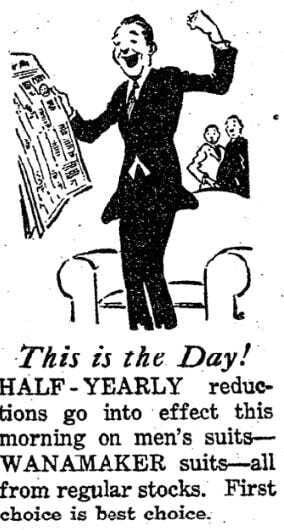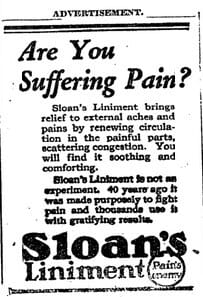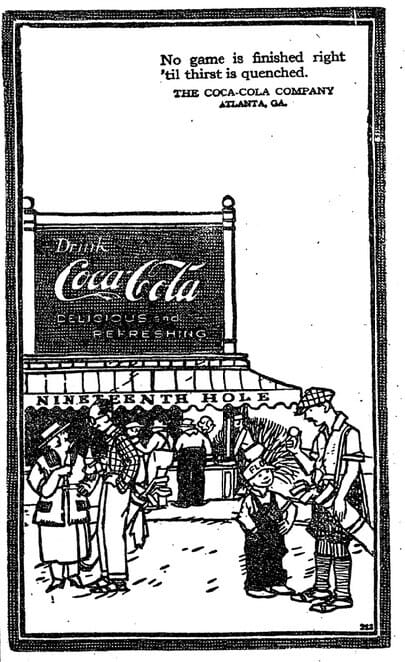- Strange Times
- Posts
- Strange Times 166: 40 Watts Per Eel
Strange Times 166: 40 Watts Per Eel
Last week marked the introduction of a new feature for this newsletter: Strange Pulp, an irregular journal of weird fiction. Read the first issue here, or get it in PDF or for your e-reader.
Oh, and if you haven’t gotten Deadball Junior, this is your last chance!
Today brings long skirts, medium eels, and a short chase through the tunnels beneath New York City. Feed your damn sloths on…
June 15, 1921
On the eve of her planned execution, the sentence of Brooklyn’s Hattie Dixon, sentenced to die for her role in the murder of Margaret Morton, is commuted to life imprisonment.
A band of “savage bandits” in New Jersey kill one and leave two to die as they make off with $20,000 worth of silk.
Russia’s exiled Prince Nicholas Engalitcheff claims in court that he is down to his last dollar, and that he cannot pay debts totaling $2,400 to garage owners and $200 to the Waldorf Hotel.
The Weather: Fair today; Thursday, partly cloudy; not much change in temperature; fresh northwest winds.

If trends in hems continue, by 2022 they’ll be dragging seven or eight feet behind the ankle. I can’t wait to see it!
PARIS, June 13.—Long skirts began an “offensive” yesterday at Chantilly, when all Paris turned out to see the French Derby, one of the most important racing fixtures of the year. The offensive was launched by dressmakers with careful strategy.
The grand week of the Paris season falls next week, and during it one of the most interesting subjects of discussion will be whether skirts are to be long or short.
Yesterday’s display was merely an affair of outposts impersonated by mannequins. Wearing gracefully trailing skirts that covered the ankles, they strolled about the paddock of the beautiful course canvassing opinion. The verdict was said to be decidedly favorable. The short skirt has had its day, according to the authorities, and will not survive the Summer.
One other fashion of the season which scored a success was a sunshade about the size of a dinner plate in silks of all colors. As a shade from the sun its use is considered to be as great as if it were full sized, and at the same time it has, according to the authorities, advantages as an aid to expression. Its daintiness can be made to serve every varying mood and fancy in the same measure as a fan. By philosophers of fashion its advent is regarded as one more sign of woman’s post-war return to femininity and the subtler, softer wiles and ways.
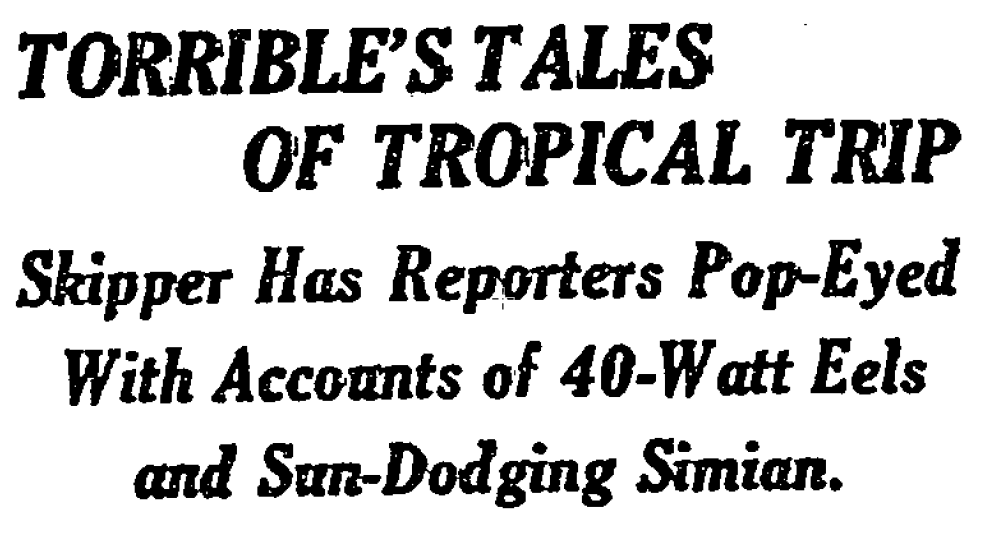
An absolute abomination of alliteration, this is a fine example of one of my favorite genres of old news story: “Someone told us about a trip they went on.”
A terrible tale of the torrid zone was unfolded by Captain R.H. Torrible yesterday on the arrival of the Booth Line steamer Denis, which plies between New York and Manaois, a port about 1,000 miles up the Amazon River. The skipper vowed by marine and other saints that never had he seen sights so strange.
On a river which empties into the Amazon, near Manaois, he said he saw myriads of electric eels so strongly charged with electricity that the broad bosom of the stream was flooded with light and the crew were able to read their pocket Bibles by the glow, which was estimated at forty watts per eel. When seamen brought some of these high-voltaged eels on deck, Captain Torrible said, the ship’s dynamos were short circuited and there was the dickens to pay until the eels were disconnected.
But Skipper Torrible hadn’t finished. While the Denis was tied up at the pier a boy who was working with a loading gang fell into the river. The luminous eels surged around him, and when he was picked up he was dead. A physician who examined the body said that the lad was the victim of an electric overcharge. Captain Torrible brought back with him a sun-dodging monkey, which prowled only at night. He declared that the simian, like an owl, was casual and apathetic by day, but when the sun went over the horizon the monkey had 20-20 glims and was an ultra-lively stepper. The Captain took newspaper men into his cabin, where the pet was kept, and pulled down the shades. The sun dodger reacted to the gloom by appropriating and immediately eating a straw kelly recently purchased at a considerable outlay by one of the reporters.
The skipper said that he had purchased a Brazilian sloth to bring back to the United States, but the animal was too lazy to eat and died on the way here.
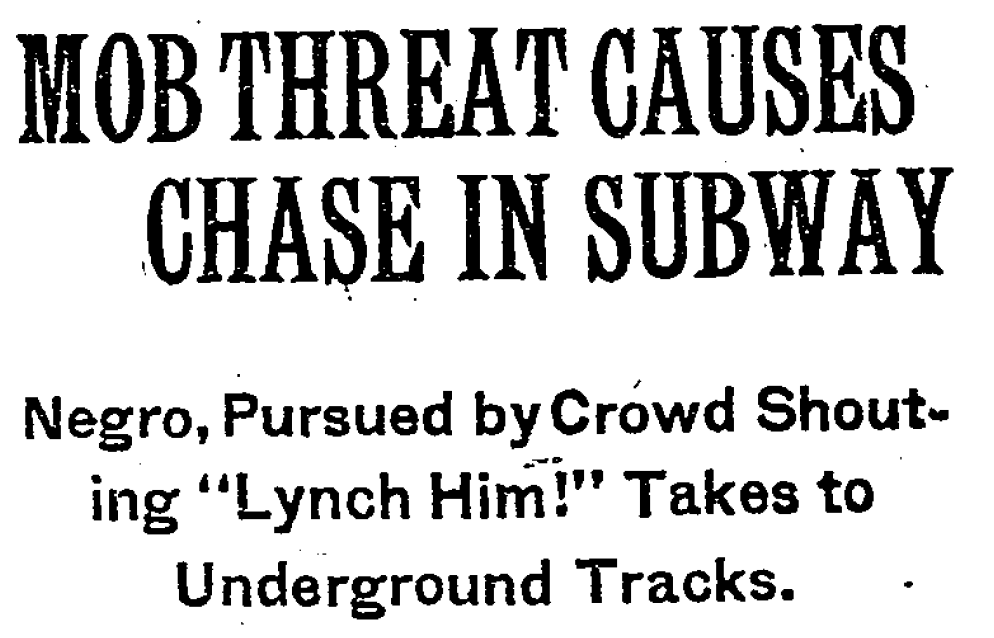
It’s amazing how willing New York pedestrians were to join any mob that happened to come along. Perhaps this is what happens when people aren’t distracted by their phones? In any case, this is reminder 14,765,982 that murderous racism is a heritage shared by every part of the United States.
Followed by a crowd shouting “Lynch him!” Berry Wason, 29, a negro bootblack employed in a barber shop at 51 West Twenty-ninth Street, sought safety on the north-bound tracks of the Broadway subway at Twenty-ninth Street at 8 o’clock last night. When Policeman Peter Nathan attempted to rescue him from imminent peril—the third rail and approaching trains—the bootblack ran from his refuge behind one of the subway supports and headed north along the track.
Nathan, who wanted Wason to answer a charge of felonious assault on the complaint of Anthony Suydanides, a barber in the same shop, gave chase. The motorman of a north-bound train, thinking the two figures he saw ahead were track walkers, sounded his whistle and slowed down. Wason and the policeman, the latter some distance behind, stepped between the north and south bound tracks to let the train pass. A south-bound train whisked by at the same moment, giving the amateur subway riders an anxious moment.
Wason resumed his flight in the wake of the northbound express, Nathan close behind. Nathan chose the southbound track in taking up the chase so he could see oncoming trains. The negro nearly was captured when he dodged at the sound of another whistle, but managed to keep ahead of Nathan until he reached the island platform at Thirty-fourth Street.
There Nathan’s shouts attracted Policeman Charles Frayler, who was alighting from a train. Frayler stopped the negro. The policeman learned that an angry group of Greeks, friends of Suydanides, had followed from Twenty-ninth Street by way of Broadway and were gathered above ready to attack the bootblack.
The two policemen decided that the best way to escort the prisoner to the West Thirtieth Street Station would be to return along the tracks. So they cautiously walked back to the Twenty-eighth Street Station through the subway, twice dodging trains on their way. The infuriated crowd had scattered, but another, a curious one, had gathered on reports of a subway chase.
At the West Thirtieth Street Police Station Wason was charged with striking Suydanides on the head with a hammer. Apparently it all began shortly before 8 o’clock when the barber, at closing time, ordered the bootblack to clean out the sterilizer. Wason refused, because he had a “date.” He told Desk Lieutenant West that Suydanides picked up a razor and menaced him with it. At first he thought the barber was joking, he said, but when he saw a look of determination in the latter’s eyes he picked up the nearest weapon, a hammer, and cracked Suydanides on the head. Then he ran.
The barber followed shouting, “Lynch him,” a cry taken up by others in the street near Sixth Avenue, and before the negro had reached Broadway more than 250 persons were chasing him. At this point Policeman Nathan headed of Suydanides and his followers and the subway chase began.
“I knew they would lynch me if I got caught,” Wason told the desk lieutenant, “so I kept on running. I’d rather be killed by a subway train. I only hit him in self-defense.”
Suydanides was treated by Dr. Sutton of New York Hospital for a deep razor cut on his right hand. He said the razor closed when he was struck.
